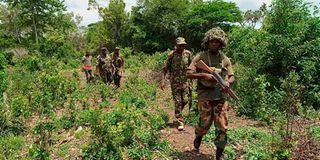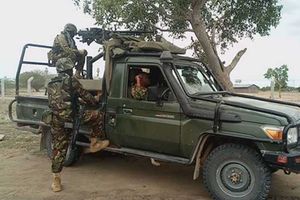
Security officers inside Boni Forest in Lamu.
The anti-terror operation that has lasted for close to a decade in Lamu County is far from over, as the government cites security and economic risks posed by al-Shabaab insurgents to the country and region.
In September 2015, the government launched a multi-agency security operation named Operation Amani Boni (OAB) to flush out Shabaab militants believed to be hiding inside the dense Boni Forest.
The operation, whose effectiveness has been questioned by some Kenyans, is conducted by the Kenya Defense Forces (KDF) in conjunction with the National Police Service (NPS) and the National Government Administration Officers (Ngao). KDF is designated as the lead agency.
Speaking on Sunday at the Magogoni Naval Base in Manda Bay, Lamu County, the general officer leading Eastern Command, Major General Luka Kutto, admitted that the al-Shabaab terrorists still pose a threat to the country and region’s security, but that the military will not relent until the enemy is defeated.
Mr Kutto spoke as he concluded a weeklong visit to the troops undertaking Operation Amani Boni.
He noted that the ongoing operation in Boni Forest is crucial for regional stability, as the forest's proximity to Somalia and its use as a transit route for terrorists makes it a key area of concern for the broader East African region.

Kenya Defense Forces special forces officers in operation at Mangai in Boni forest in Lamu County.
He concurred that the continued military actions against Al-Shabaab have helped to remove the immediate threat, adding that he is confident long-term peace and stability will be attained in the region.
The Major General vowed to ensure mega regional and state projects and infrastructure like the Lamu Port-South Sudan-Ethiopia Transport (Lapsset) corridor receive full protection from KDF.
Lapsset is a regional infrastructure project in East Africa that aims to create a transport corridor connecting the Sh310 billion Lamu Port in Kenya with South Sudan and Ethiopia.
It consists of several key components, one being the port at Lamu’s Kililana area which started operations on May 20, 2021.
Other components include a transboundary transport network of roads, railways, and oil pipelines, international airports, resort cities, and special economic zones.
“I am, as well, confident with all the KDF stationed along Lapsset Corridor. You’re of critical importance in securing Kenya’s ambitious infrastructure projects. Your presence along the Lapsset Corridor is not just merely about controlling territory, but is all about protecting the economic future of the country,” he said.
Maj-Gen Kutto’s visit came at a time when there has been growing concerns from the public on the effectiveness of the multi-agency operation.
“We’ve been witnessing cases of al-Shabaab appearing and disappearing in some places of Lamu, including Boni Forest where there’s the ongoing multi-agency security operation.
" It's disappointing"
These attacks normally prompt us to question the effectiveness of the Boni Operation,” said Ms Maryam Gubo of Basuba Village in Boni Forest.
In a recent interview, Vocal Africa Chief Executive Officer Hussein Khalid said there are huge budgetary allocations set aside for such kinds of operations yet terrorists still manage to enter the country through the forest.
“It’s disappointing that despite hundreds of millions of shillings being spent for such operations, we’re still witnessing incidents of insurgents operating very normally with no action taken by the military,” said Mr Khalid.

Boni Forest.
However, the government has often maintained that the presence of the multi-agency security team has managed to control movement of terrorists into the country from Somalia as compared to how the situation was in the past ten years.
Apart from directly fighting the enemy, security agencies have also been sensitising locals about terror incidents and how to combat them.
Such initiatives are aimed to strengthen cooperation between security agencies and local communities, enhance public awareness of security threats, and promote sustainable peace and stability in the region by stressing on the importance of early warning systems, intelligence-sharing, and active participation in security matters by the public.









